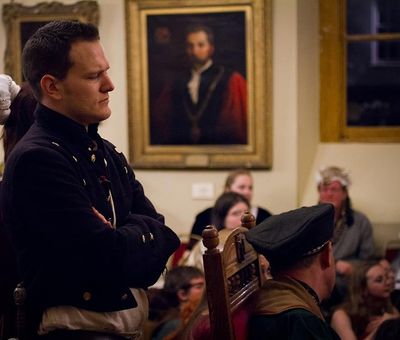The League leadership
m (added quote) |
Paulwilder (talk | contribs) |
||
| (54 intermediate revisions by 10 users not shown) | |||
| Line 1: | Line 1: | ||
<quote> | <quote>If you cross a bravo they might break your fingers; cross a merchant prince and they’ll ruin you. </quote> | ||
The League cities are | {{CaptionedImage|file=PBtT.jpg|title=The earliest guilds were part trade union, part cartel and part secret society.|caption=The League recognises an obivous metaphor when it sees one.|align=left|width=400}} | ||
The League cities are administered by the Empire, but they are run by the [[Guilds|guilds]]. These economic affiliations draw members from every section of League society united by common interests and a desire to work together to acquire wealth. The earliest types of guild were formed as confraternities of workers. They were organized in a manner something between a trade union, a cartel, and a secret society. Today only a few guilds limit themselves to just one craft; most have expanded to include merchants and traders and thereby cover any economic activities they can draw profit from. | |||
__TOC__ | |||
Each guild is headed by a merchant prince - an honorific title for the most economically powerful individuals that harks back to pre-Imperial times. The title is the same for all genders, a mark of respect for [[Aldones di Sarvos]], the League's first merchant prince. Together the most powerful merchants choose their senators but beyond this they usually leave the administration of the cities to the civil service, allowing them to concentrate on increasing the wealth of their guild. | |||
The | The guilds are not merely a matter of shared interests, but also of oaths and loyalties. Membership of a guild represents one of the most important loyalties a citizen of the League can hold. It is considered at least equal in importance to the loyalty owed to the League, the Empire and one's city. Those who betray their guild find every door closed to them and face exclusion from society and economic life. This is a short road to ruin in the League, a fate that most citizens will do anything to avoid. It is their ability to apply these sanctions that gives the guilds much of the power and influence they wield. | ||
In the League, people wear [[Rings in the League|rings]] to demonstrate their allegiances, wearing one for each major loyalty they owe. | |||
{{CaptionedImage|file=VardTeme.jpg|align=right|width=300}} | |||
==Leading a territory== | |||
Each city in the League is a [[territory]] of its own and so sends one [[Senator]] to the [[Imperial Senate]]. Any citizen of the League can have a say in the identity of their Senator - provided they are prepared to work for it. The Civil Service compiles and maintains records of what [[business|investments]] are owned by an individual, and they are allocated a number of votes based on the value of the properties they own in that city. | |||
These votes are represented by official "bonds", which are distributed to all electors at the start of the summit. Senatorial candidates must convince the electors to give them their bonds to show their support. At the point where all the bonds have been counted and the election has been officially declared as ended, the candidate with the largest amount of support as represented by the value of their combined bonds, becomes the Senator. | |||
While the process itself is quite above board, that does not prevent a fair degree of politicking both in front of and behind the scenes. For example, it is not unknown for an individual to claim to be collecting bonds on behalf of one individual, only to then hand them over to another, or at the final counting for an obviously losing candidate to negotiate handing their stack of bonds over to another candidate so they can win. | |||
Residency is important - a citizen only receives bonds if they own a business in the contested territory. Citizens who [[Resource#Changing_Territories|move from one city to another]] are eligible to vote in the new city only once a year has passed since they last voted in a senator election. | |||
The senators for each Imperial territory are re-elected at specific equinox and solstices during the year. The senator for [[Holberg]] is elected at the Spring Equinox, the senators for [[Sarvos]] and [[Spiral]] are elected at the Summer Solstice, the senator for [[Tassato]] is elected at the Autumn Equinox, and the senator for [[Temeschwar]] is elected at the Winter Solstice. | |||
===Tallying the Votes=== | |||
Each League citizen whose [[business]] resource is in the contested territory receives votes in the election of a senator for that [[territory]]. Each character receives ten votes, plus two additional votes each time they have [[Business#Upgrades|upgraded]] their resource. Bonds are issued to each character by the civil service, and are usually included in the player's character pack at the start of an event where a Senatorial election is scheduled to take place. | |||
===Incumbent=== | |||
The current senators of the League are listed below - see the individual territory pages for a full election history for each position. | |||
* [[Holberg]] - {{#lst:Archive:All_Election_Results|Senator_for_Holberg_occupant}} | |||
* [[Sarvos]] - {{#lst:Archive:All_Election_Results|Senator_for_Sarvos_occupant}} | |||
* [[Spiral]] - {{#lst:Archive:All_Election_Results|Senator_for_Spiral_occupant}} | |||
* [[Tassato]] - {{#lst:Archive:All_Election_Results|Senator_for_Tassato_occupant}} | |||
* [[Temeschwar]] - {{#lst:Archive:All_Election_Results|Senator_for_Temeschwar_occupant}} | |||
{{The League Links}} | |||
[[Category:The League]] | [[Category:The League]] | ||
[[Category: | [[Category:Archetype]] | ||
Latest revision as of 17:52, 3 September 2024
If you cross a bravo they might break your fingers; cross a merchant prince and they’ll ruin you.
The League cities are administered by the Empire, but they are run by the guilds. These economic affiliations draw members from every section of League society united by common interests and a desire to work together to acquire wealth. The earliest types of guild were formed as confraternities of workers. They were organized in a manner something between a trade union, a cartel, and a secret society. Today only a few guilds limit themselves to just one craft; most have expanded to include merchants and traders and thereby cover any economic activities they can draw profit from.
Each guild is headed by a merchant prince - an honorific title for the most economically powerful individuals that harks back to pre-Imperial times. The title is the same for all genders, a mark of respect for Aldones di Sarvos, the League's first merchant prince. Together the most powerful merchants choose their senators but beyond this they usually leave the administration of the cities to the civil service, allowing them to concentrate on increasing the wealth of their guild.
The guilds are not merely a matter of shared interests, but also of oaths and loyalties. Membership of a guild represents one of the most important loyalties a citizen of the League can hold. It is considered at least equal in importance to the loyalty owed to the League, the Empire and one's city. Those who betray their guild find every door closed to them and face exclusion from society and economic life. This is a short road to ruin in the League, a fate that most citizens will do anything to avoid. It is their ability to apply these sanctions that gives the guilds much of the power and influence they wield.
In the League, people wear rings to demonstrate their allegiances, wearing one for each major loyalty they owe.
Leading a territory
Each city in the League is a territory of its own and so sends one Senator to the Imperial Senate. Any citizen of the League can have a say in the identity of their Senator - provided they are prepared to work for it. The Civil Service compiles and maintains records of what investments are owned by an individual, and they are allocated a number of votes based on the value of the properties they own in that city.
These votes are represented by official "bonds", which are distributed to all electors at the start of the summit. Senatorial candidates must convince the electors to give them their bonds to show their support. At the point where all the bonds have been counted and the election has been officially declared as ended, the candidate with the largest amount of support as represented by the value of their combined bonds, becomes the Senator.
While the process itself is quite above board, that does not prevent a fair degree of politicking both in front of and behind the scenes. For example, it is not unknown for an individual to claim to be collecting bonds on behalf of one individual, only to then hand them over to another, or at the final counting for an obviously losing candidate to negotiate handing their stack of bonds over to another candidate so they can win.
Residency is important - a citizen only receives bonds if they own a business in the contested territory. Citizens who move from one city to another are eligible to vote in the new city only once a year has passed since they last voted in a senator election.
The senators for each Imperial territory are re-elected at specific equinox and solstices during the year. The senator for Holberg is elected at the Spring Equinox, the senators for Sarvos and Spiral are elected at the Summer Solstice, the senator for Tassato is elected at the Autumn Equinox, and the senator for Temeschwar is elected at the Winter Solstice.
Tallying the Votes
Each League citizen whose business resource is in the contested territory receives votes in the election of a senator for that territory. Each character receives ten votes, plus two additional votes each time they have upgraded their resource. Bonds are issued to each character by the civil service, and are usually included in the player's character pack at the start of an event where a Senatorial election is scheduled to take place.
Incumbent
The current senators of the League are listed below - see the individual territory pages for a full election history for each position.
- Holberg - Kaspar Yakovich von Holberg
- Sarvos - Rosalina Gulia Viola di Sarvos
- Spiral - Genoveva Barossa d'Apulian
- Tassato - Cesare Sanguineo Rezia Di Tassato
- Temeschwar - Giuseppe Sanguineo von Temeschwar
Further Reading
Core Brief
Additional Information

